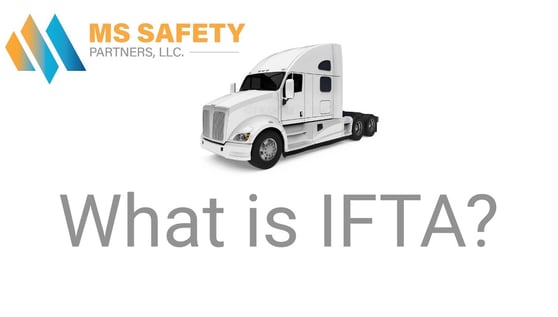CARB - UIIA - SCAC REGISTRATIONS - 630-422-7497 - PERMIT@SAFETYPARTNERS.ORG
IFTA: A Guide to Understanding the International Fuel Tax Agreement
This blog post provides a comprehensive guide to understanding the International Fuel Tax Agreement (IFTA), which simplifies the reporting and payment of fuel taxes by interstate motor carriers in the lower 48 U.S. states and Canadian provinces.
IFTA
Marcin Rogalski
5/11/20234 min read


If you're in the trucking industry, chances are you've heard of the International Fuel Tax Agreement (IFTA). But what exactly is IFTA, and how does it work? In this guide, we'll take a closer look at IFTA and provide you with the information you need to understand this important agreement.
What is IFTA?
IFTA is an agreement between the lower 48 U.S. states and Canadian provinces that simplifies the reporting and payment of fuel taxes by interstate motor carriers. Under IFTA, carriers only need to file a single fuel tax return and make one payment for all of the jurisdictions in which they operate.
How does IFTA work?
Under IFTA, carriers are required to keep detailed records of their fuel purchases and usage. This includes information such as the date and location of the fuel purchase, the amount of fuel purchased, and the odometer reading of the vehicle. Carriers are also required to track the number of miles traveled in each state or province.
At the end of each quarter, carriers use this information to calculate their fuel tax liability for each jurisdiction in which they operated. They then file a single fuel tax return and make one payment for all of the jurisdictions in which they operated.
Why is IFTA important?
IFTA is important for several reasons. First, it simplifies the reporting and payment of fuel taxes, reducing paperwork and administrative burdens for carriers. Second, it ensures that fuel taxes are fairly distributed among the states and provinces in which carriers operate. Finally, it helps to prevent fuel tax evasion, which can be a significant problem in the trucking industry.
What are the penalties for non-compliance?
Carriers that fail to comply with IFTA regulations can face significant penalties, including fines and even suspension of their operating authority. In addition, carriers that are found to be non-compliant with IFTA regulations may be subject to increased scrutiny from regulators and law enforcement agencies.
How can carriers ensure compliance with IFTA?
To ensure compliance with IFTA regulations, carriers should keep detailed records of their fuel purchases and usage. They should also ensure that their drivers are properly trained on IFTA requirements and that they understand the importance of accurate record-keeping.
In addition, carriers should consider using electronic logging devices (ELDs) and other technologies to help streamline their operations and ensure compliance with IFTA regulations. ELDs can automatically track fuel usage and mileage, making it easier to calculate fuel tax liability and reduce the risk of errors.
Overall, IFTA is an important agreement that helps to ensure fair and consistent collection of fuel taxes in the trucking industry. By understanding IFTA requirements and taking steps to ensure compliance, carriers can avoid penalties and streamline their operations for greater efficiency and profitability.


Master Safety & Permits LLC: Your One-Stop Solution for IFTA Filing
As a carrier in the trucking industry, filing your International Fuel Tax Agreement (IFTA) returns can be a time-consuming and complex process. That's why many carriers turn to third-party service providers like Master Safety & Permits LLC to help streamline their IFTA filing process.
Master Safety & Permits LLC is a professional consulting and permitting service that specializes in the trucking industry. Our team of experts has years of experience in filing IFTA returns for carriers of all sizes and can help ensure that your IFTA returns are filed accurately and on time.
Here are some of the ways in which Master Safety & Permits LLC can help with your IFTA filing:
Accurate Record-Keeping: Our team can help ensure that your fuel and mileage records are accurate and up-to-date. This includes tracking fuel purchases, mileage, and other data required for IFTA reporting.
Timely Filing: We understand the importance of filing your IFTA returns on time to avoid penalties. Our team can help ensure that your returns are filed on time, every time.
Compliance: Our team stays up-to-date with IFTA regulations to ensure that your returns are in compliance with all applicable rules and regulations.
Electronic Filing: We offer electronic filing options that make the IFTA filing process faster and more efficient, reducing the risk of errors and delays.
Audit Support: In the event of an IFTA audit, our team can provide support and assistance to ensure that your records and returns are in compliance with audit requirements.
By partnering with Master Safety & Permits LLC for your IFTA filing, you can save time and reduce administrative burdens while ensuring compliance with IFTA regulations. Our team of experts will work closely with you to understand your unique needs and develop a customized solution that meets your specific requirements.
In addition to IFTA filing, Master Safety & Permits LLC also offers a range of other consulting and permitting services, including DOT compliance, MCS-150 updates, and oversize/overweight permits. We pride ourselves on our personalized approach and commitment to delivering exceptional customer service.
In conclusion, filing IFTA returns can be a complex and time-consuming process for carriers in the trucking industry. Partnering with a professional consulting and permitting service like Master Safety & Permits LLC can help streamline the process and ensure compliance with all applicable rules and regulations. Contact us today to learn more about how we can help with your IFTA filing needs.
Follow Us
Contact
(630)-422-7497
permit@safetypartners.org
Copyright © 2022 Master Safety & Permits LLC - All Rights Reserved. Helping Truckers Since 2008.
Industry Partners














